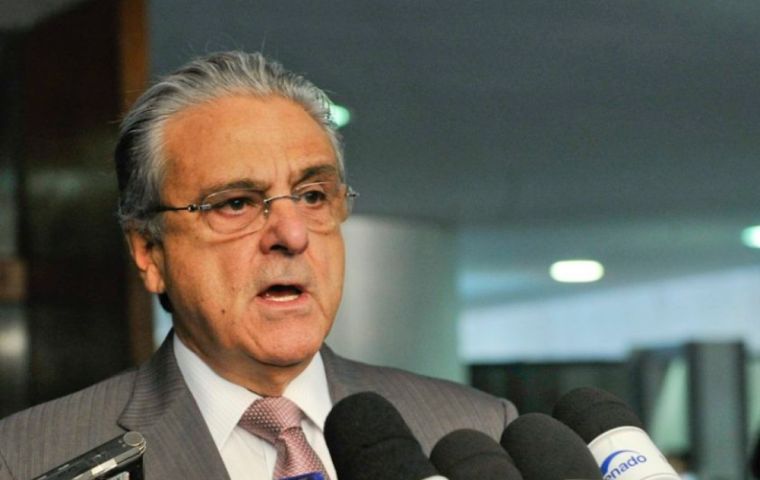MercoPress. South Atlantic News Agency
Brazil's Industry Confederation expects 1,2% to 1,8% GDP growth in 2022
 CNI president Robson Braga de Andrade points to current problems like inflation, high unemployment, and supply normalization of global value chains
CNI president Robson Braga de Andrade points to current problems like inflation, high unemployment, and supply normalization of global value chains Brazil's GDP is forecasted to expand by 1,2% in 2022, according to the Brazilian National Industry Confederation (CNI). However since 2022 is an election year and public opinion is strongly divided, the estimate is simply that, an estimate, following on a reasonably dynamic 4,7% growth this year with record exports.
Robson Braga de Andrade, CNI’s president, anticipated that to make the 1.2% effective, it would be necessary to overcome, by the second half of the year, current problems like inflation, high unemployment, and supply normalization of global value chains. The projection was included as part of the document “Brazilian economy: 2021-2022”, released this month as an end of the year situation.
“The economy should benefit from the normalization of public services – still running below pre-pandemic levels – and a few industrial sectors, mostly those connected to investments, like the construction market chain and capital goods, which might see their production levels increased by the remaining of 2021’s orders and projects”, explains Robson de Andrade.
Following on this presentation, in the most pessimistic scenario, Brazil’s GDP growth in 2022 is expected to only reach 0.3% and, in the most optimistic one, 1.8%.
As to the year that is ending CNI expects to see a 4,7% growth. The estimate is lower than what had been previously stipulated at the beginning of the year, due to the constant industry drops in the second half of the year mainly because of supply bottlenecks. Robson Andrade argues that while Brazil’s current GDP growth might revert the negative effects of 2020’s sub-optimal results, it does not mean that the structural problems and challenges aggravated by the pandemic have been overcome. There is still a noticeable drop in economic activity in certain sectors and next year’s prospects are not so thrilling.
“High inflation rates that lead to elevated interest rates, high household debt, high unemployment rates, inputs and raw material shortages, plus rising energy costs are unfavorable factors undermining the country’s economic situation. Additionally, there are still many uncertainties regarding the pandemic, as well as fear of a relapse as the one seen in Europe”, points out Robson Braga de Andrade.
As to overall foreign trade in 2021, exports have been driven mainly by prices, above all commodity prices, but imports have shown a considerable spike in terms of volume.
CNI’s estimates are exports equivalent to US$ 278.4 billion (33.1% increase compared to 2020); US$ 219.5 billion imports (up 38.2%), and a trade surplus of US$ 58.9 billion (up 16.9%).
Regarding the incoming year, normalization of supplying inputs and raw materials and the Real effective exchange rate – still quite undervalued – will give impetus to Brazilian exports and encourage import substitution. CNI projects that exports might reach US$ 280 billion next year, slightly higher than in 2021.
Other highlights in the CNI document, Commerce’s GDP is forecasted to increase by 6.5% in 2021. On the other hand, services sector GDP, not taking commerce into consideration, shall grow by 4.2% this year. Lastly, agriculture have reached an expansion of 2%.
Construction has shown a positive performance, above expectations, from an initial 5%, but now has reached 8,2%. The current supply shortage of semiconductors and chips should not impact manufacturing production in large companies as of the second half of 2022. However the risk of reduced magnesium production in China has the potential to cause an aluminum shortage, which would affect several industrial sectors. About 80% of the world’s magnesium production is Chinese.
As to the global economy prospects in 2022, CNI estimates it will be impacted by attempts to control inflation, higher international interest rates, energy shortages, lack of raw materials because of the persistence of imbalances in global supply chains. This is expected to have a moderate influence in commodities' international prices and will weigh heavily in Brazil's GDP
Finally households' income is a big question mark, since the average real income of employed persons dropped 11,1% between third quarters of 2020 and 2021, to which must be added inflation and increased household debt. But it is election year and the government has plans to launch its Emergency Brazil plan with direct financial monthly support for families.




Top Comments
Disclaimer & comment rulesCommenting for this story is now closed.
If you have a Facebook account, become a fan and comment on our Facebook Page!